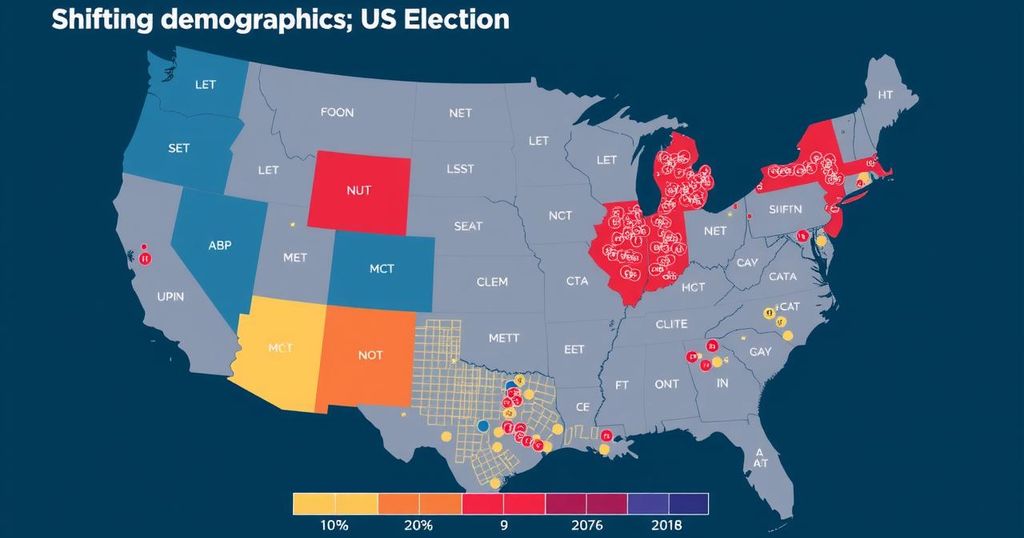Gender Dynamics in the 2024 Election: Trump’s Appeal to Male Voters and Decline among Women
A recent New York Times poll indicates that Donald Trump holds an 11-point advantage over Kamala Harris among male voters, bolstered by increasing support from Hispanic-American and African-American men. Young men, feeling pressure regarding masculinity, tend to favor Trump, whose rhetoric resonates with their concerns. Conversely, Trump is losing support among women, particularly due to backlash against his misogynistic comments and changes to reproductive rights laws. The 2024 election orbits around significant gender divides in voting preferences, particularly driven by evolving perceptions of masculinity and women’s rights.
According to a recent New York Times poll, Donald Trump is currently enjoying a significant lead over Kamala Harris among male voters, with an advantage of 11 percentage points. His primary base of support comprises white men; however, he has additionally made substantial inroads with both Hispanic-American and African-American men. Despite his history of employing derogatory language towards Hispanics and promoting anti-immigrant narratives, polling indicates approximately 50% of Hispanic men view Trump as adequately strong for presidential duties. Notably, about one in four African American men under 50 express their intent to vote for Trump, which is particularly striking given Trump’s controversial stances in the past, such as questioning Barack Obama’s legitimacy to office and his defense of white supremacists during the Charlottesville incidents. One of the pivotal reasons behind the appeal of Trump to young men lies in a notable gender shift in political affiliations, where young men are increasingly identifying as Republican and conservative. The gap between young men and women regarding political beliefs has widened significantly over the past 25 years, and young men in the U.S. appear to be responding positively to Trump’s rejection of traditional societal pressures and norms related to masculinity. A study from YouGov revealed that nearly two-thirds of American men believe there is a need for better representation and valuation of men within society. Additionally, many young men experience societal expectations that can create feelings of inadequacy or a sense of fragility in their masculinity. This phenomenon, termed the fragile masculinity hypothesis, was notably observed regarding support for Trump, contrasting with patterns seen in previous elections where candidates like Mitt Romney or John McCain did not evoke a similar effect. Trump’s campaign rhetoric has increasingly resonated with a specific demographic that feels threatened by women’s advancements in society; a Pew Research study indicated that a significant percentage of Trump-supporting men believe that women’s gains come at a loss for men. In stark contrast, while Trump’s male support appears steadfast, he is witnessing a considerable decline in support among women, particularly white women. Recent trends demonstrate a pronounced mobilization of women against the misogynistic qualities of Trump’s rhetoric, along with backlash against the 2022 Supreme Court ruling that overturned Roe v. Wade, a decision that significantly impacted women’s reproductive rights. While around 61% of men and 64% of women support reproductive rights, the importance of this issue resonates more strongly with women. Despite attempts by Trump to forge a connection with female voters by presenting himself as a defender of women’s interests—referring to himself as the “father of IVF”—his off-putting comments have likely alienated many female constituents. Presently, Trump only maintains a slim lead of one percentage point among white women in 2024, a stark decline from the seven-point advantage recorded in previous elections.
The current political landscape in the United States, as expressed through voter preferences leading into the 2024 elections, illustrates a notable division along gender lines. Polling data indicates a strong alignment of male voters with Donald Trump while revealing significant concerns for his support among female voters. As such, the dynamics between the candidates reflect ongoing societal trends and shifts in traditional gender roles, particularly regarding expectations of masculinity and femininity, and the impact of recent judicial decisions on women’s rights. The article aims to delineate the patterns of male support for Trump, juxtaposed with a retreat in female backing, thereby elucidating the broader implications for both candidates as they approach the election.
The data highlights a complex interplay between gender and political affiliation in the upcoming U.S. elections. Young men are disproportionately drawn to Donald Trump, in part due to shifting perceptions of masculinity and conservative values, while women, particularly in light of recent judicial changes regarding reproductive rights, appear to be distancing themselves from Trump. The divergence in support reflects broader societal sentiments regarding gender dynamics and highlights the challenges candidates face when appealing to divergent demographics. As the election approaches, understanding these nuances will be imperative for both parties as they strategize to connect with their respective voter bases.
Original Source: theconversation.com




Post Comment